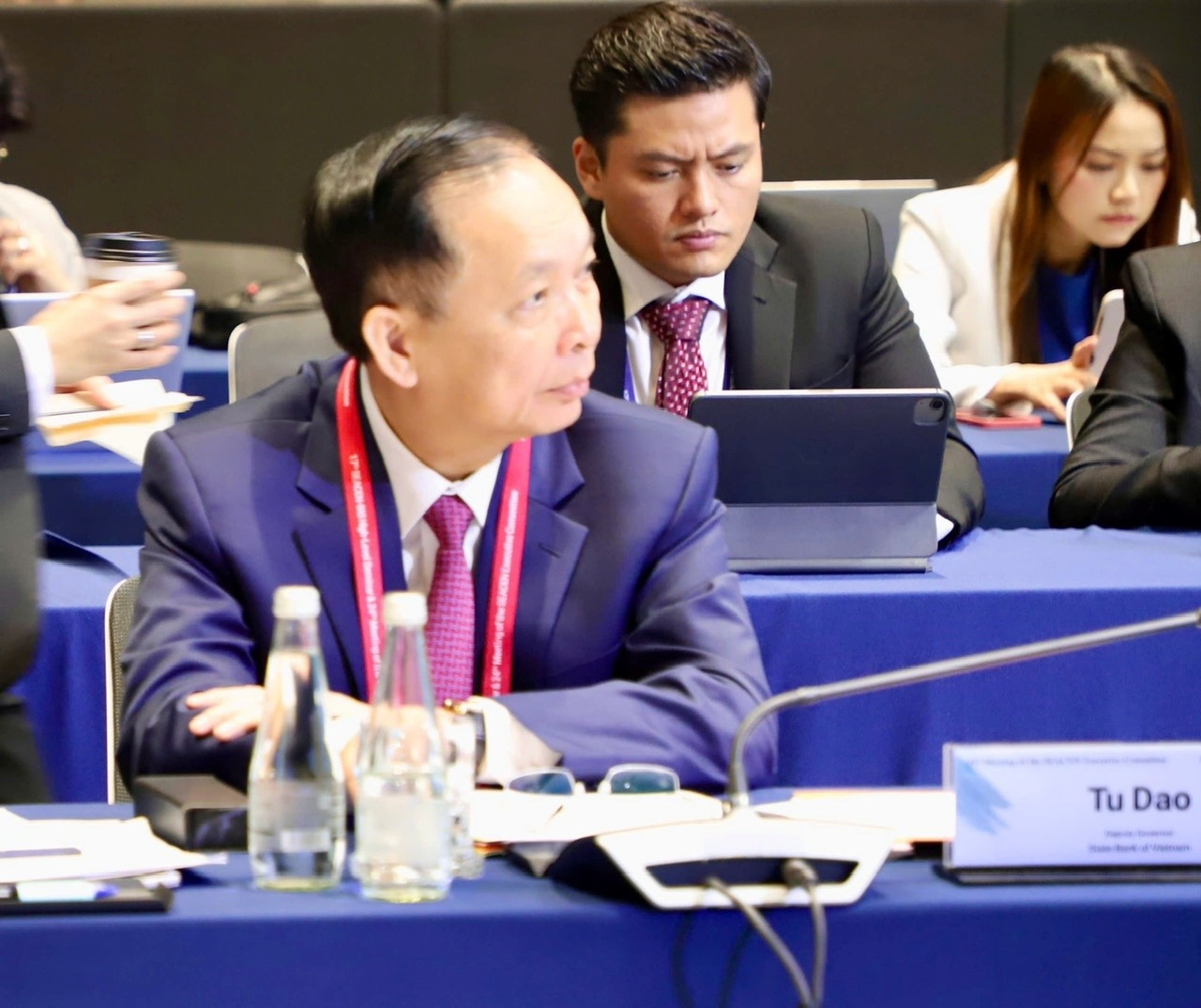From September 25–26, 2025, in Seoul, South Korea, the delegation of the State Bank of Vietnam (SBV), led by Standing Deputy Governor Dao Minh Tu, attended the 24th Executive Committee Meeting of the South East Asian Central Banks (SEACEN) Research and Training Centre and the high-level seminar jointly organized by the Bank for International Settlements (BIS) and SEACEN.

Standing Deputy Governor Dao Minh Tu speaks at the Meeting
The 24th SEACEN Executive Committee (SEACEN-EXCO) Meeting brought together 19 delegations from member central banks (CBs) and monetary authorities (MAs), headed by Deputy Governors and Deputy Executive Directors. At the meeting, the SEACEN Executive Director reported to the Committee on the 2025 operational results and the SEACEN Medium-Term Strategic Plan 2026–2030. The CB/MA leaders highly appreciated SEACEN’s achievements over the past year, discussed and provided comments on the draft Strategic Plan and SEACEN’s future orientation in training, research, and professional cooperation with renowned international experts, organizations, and strategic partners, with the aim of building SEACEN into a leading regional center for training and research.
In his remarks, Deputy Governor Dao Minh Tu welcomed SEACEN’s strong efforts in developing the draft Medium-Term Strategic Plan for 2026–2030, which correctly identifies strategic priorities and clearly reflects SEACEN’s core value of serving as a center of learning, networking, and knowledge-sharing for central banks in the Asia-Pacific region.
The Strategic Plan outlines three main pillars: responding to uncertainty, digital transformation, and managing climate risks and sustainable finance. These issues are both urgent and long-term in shaping central bank activities. At the same time, SEACEN’s approach - from training implementation methods to organizational governance models - demonstrates a clear determination to innovate and enhance capacity to be “future-ready.” On behalf of the SBV, Deputy Governor Tú expressed support, in line with the majority, for the draft Strategic Plan and for convening a special EXCO meeting in Q1/2026 to consider and approve SEACEN’s new Strategic Plan.
As customary, the Executive Committee also carried out the approval procedures for SEACEN’s training, research, and budget plan for 2026 and recommended submitting them to the Board of Governors (BOG) for adoption at the Annual BOG Meeting scheduled for October 2025 in Indonesia.
As an active member of SEACEN, the SBV consistently participates in high-level activities such as the Governors’ and Deputy Governors’ Meetings and the Executive Committee Meetings, where important organizational matters are discussed and decided. Participation in SEACEN has also enabled the SBV to send many staff members to conferences, workshops, training programs, research initiatives, and policy dialogues. This provides opportunities to share experiences, update new knowledge with peers from member CBs, and engage with international monetary, financial, and banking experts on core areas such as monetary policy management, financial stability, and inflation control - thereby strengthening professional capacity, advancing international integration, and contributing practically to regional financial stability.
Overview of the Meeting
As part of the mission, Deputy Governor Dao Minh Tu also attended the high-level seminar jointly organized by BIS and SEACEN under the theme “Central Bank operations in the context of rising global uncertainty.”
At the seminar, speakers - including economists and monetary experts from BIS, SEACEN, the People’s Bank of China, the Bank of England, the London School of Economics and Political Science, and the Japan External Trade Organization - warned of the significant increase in global uncertainty, which is continuing and will continue to pose major challenges to central banks. Analyses highlighted the main sources of uncertainty, including sudden changes in trade policies, political instability in major economies, localized and regional geopolitical conflicts, climate crises, and the rise of disruptive technologies (artificial intelligence, blockchain) that are reshaping global finance and trade.
The seminar also clarified the negative impacts of these uncertainties on the macroeconomy, such as unprecedented shifts in international trade rules, effects on capital flows and employment, increased production input costs, and reduced competitiveness. From a financial perspective, experts discussed the resilience of the banking sector amid heightened uncertainty, vulnerabilities in risk reassessment, and factors influencing the international role of the US dollar.
All seminar participants agreed that in today’s challenging context, central banks must develop flexible strategies to maintain macroeconomic and financial stability. A key solution emphasized was closer coordination with regional countries and international organizations, strengthening supervisory and risk management mechanisms, while implementing long-term strategies to enhance the resilience of the banking system in order to cope with and overcome uncertainty.
HM
